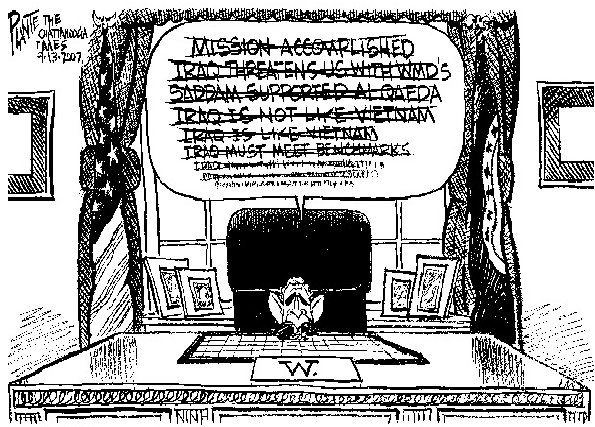Search
Democracy Links
Member's Off-site Blogs
thanks george .....

Turning Success Into Failure
from the Centre for American Progress
This Sunday marks the sixth anniversary of the U.S.-led invasion of Afghanistan. Following the 9/11 attacks, President Bush promised the country "sustained, comprehensive and relentless operations to drive [terrorists] out and bring them to justice." Six years later, both Osama bin Laden and his number two man, Ayman al-Zawahiri, have yet to be captured.
The Taliban and al Qaeda, once virtually destroyed in Afghanistan, "have reconstituted their capabilities and command structure along the Afghan-Pakistan border, again posing a threat to the national security of the United States." Despite promises from the administration that it is committed to fighting insurgents in Afghanistan, it has "not provided the necessary resources, troops, and leadership to keep Afghanistan on the path to stability." The country has less and less to show for the sacrifices made by the 443 Americans killed in Afghanistan, as strides made following the invasion have largely been allowed to lapse under the administration's watch.
The Center for American Progress has produced a video commemorating the anniversary of the invasion, which outlines how the situation has deteriorated and the steps that must be taken to rectify it. Watch it here.
While great strides were made following the U.S. invasion of Afghanistan in 2001, the situation has deteriorated dramatically since 2005. Because of the drain from the war in Iraq, the administration has been unable to send enough resources or troops to Afghanistan to ensure success there. The Bush administration has conducted "state-building on the cheap," failing to give priority to operations in Afghanistan as part of the larger fight against international terrorist networks. "Stabilizing Afghanistan and countering the insurgency will require a massive renewed commitment.
Afghanistan needs new infusions of aid, an increase in troop levels, and a shift in focus to state-building, specifically creating a competent, accountable government." Tayeb Jawad, Afganistan's ambassador to the United States, recently told The Progress Report, "In the past five years, there was an underinvestment in building the infrastructure in Afghanistan, including the quality of life of the Afghans." Jawad said U.S. presence "should have been very robust from the beginning" and "assistance should have been much stronger." (Read more on his interview here.)
While Bush focuses his attention on Iraq, "Afghanistan is currently suffering its most violent year since the 2001 U.S.-led intervention." A recent report from the United Nations showed that violence in Afghanistan has spiked over 30 percent in the last year alone. Particularly troubling is the importation of tactics from Iraq, specifically suicide bombings and roadside bombs. Previously unknown in Afghanistan, suicide bombings have soared in frequency recently, with a "69 percent increase" in the first nine months of this year.
The Taliban's ability to finance these attacks is mainly derived from its operations in illegal drug trafficking, and Afghanistan produced "record levels of opium" in 2007. Recently, "traffickers have opened more labs that process raw opium into heroin, vastly increasing its value." These drug revenues bring in "anywhere from tens of millions of dollars to $140 million" for the Taliban.
Despite overwhelming evidence that things are heading in the wrong direction in Afghanistan, the Bush administration continues to spout rhetoric claiming progress. Former Secretary of State Donald Rumsfeld recently told GQ that Afghanistan has "been a big success!" Bush touted progress just last week, claiming that "Afghanistan is becoming a safer, more stable country." The only administration official that seems to understand the severity of the situation in Afghanistan is Defense Secretary Robert Gates, who "told a group of U.S. House Democratic lawmakers that the multinational mission in Afghanistan is suffering from a lack of resources." Gates specifically cited "the war in Iraq and the reluctance of U.S. allies to contribute more troops" as contributors to this shortage.
Although the situation in Afghanistan has deteriorated recently, experts agree that the window for success has not completely closed. Afghanistan has a functioning and legitimate government, led by Hamid Karzai, that is representative of its people. We also have a legitimate coalition of forces in Afghanistan, with 36 countries contributing troops. Finally, polling of the Afghan people shows support for an international troop presence and little support for the Taliban. Ambassador Jawad concluded, "Afghanistan is winnable and achieving victory in Afghanistan is easy. The people are your partners. All we need to do is invest in building the capacity of the Afghans to defend their own country."
- By John Richardson at 6 Oct 2007 - 8:46am
- John Richardson's blog
- Login or register to post comments
Recent comments
5 hours 13 min ago
6 hours 23 min ago
6 hours 48 min ago
7 hours 19 min ago
7 hours 24 min ago
11 hours 44 min ago
14 hours 21 min ago
14 hours 31 min ago
1 day 1 hour ago
1 day 2 hours ago